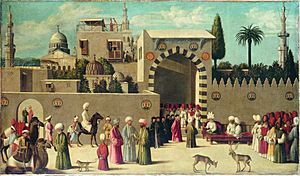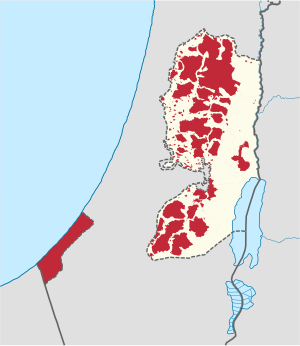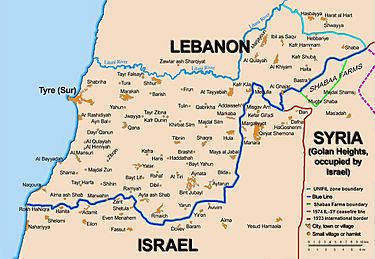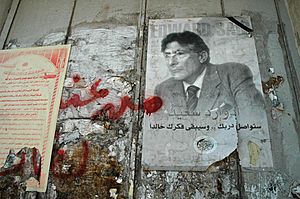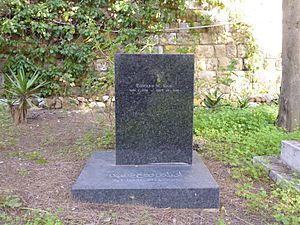Edward Said facts for kids
Quick facts for kids
Edward Said
|
|
|---|---|
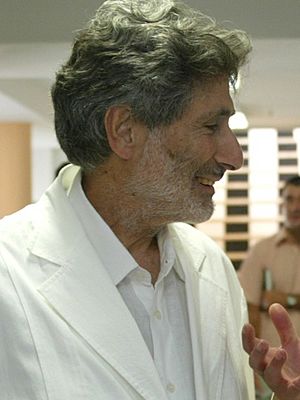
Said in Seville, 2002
|
|
| Born |
Edward Wadie Said
1 November 1935 |
| Died | 24 September 2003 (aged 67) New York City, New York, U.S
|
| Education | |
| Spouse(s) | Mariam C. Said |
| Era | 20th-century philosophy |
| Region | Western philosophy |
| School |
|
|
Notable ideas
|
|
|
Influenced
|
|
Edward Wadie Said (born November 1, 1935 – died September 24, 2003) was a famous Palestinian American professor. He taught literature at Columbia University and was a well-known public thinker. He also helped start the field of study called postcolonial studies.
Born in Mandatory Palestine, Edward Said became a U.S. citizen because his father was a veteran of the U.S. Army. He studied in British and American schools, learning about Western culture. He used his knowledge to show how the Western and Eastern worlds often misunderstood each other. This was especially true for the Israeli–Palestinian conflict in the Middle East.
Said is best known for his book Orientalism (1978). In this book, he looked closely at how the Western world often had wrong or biased ideas about the East. His ideas changed how many experts studied literature and the Middle East. Orientalism was a very important book, but it also caused a lot of discussion among scholars.
As a public thinker, Said was a member of the Palestinian National Council. He often spoke out against Israel and some Arab countries. He believed in creating a Palestinian state where Palestinians would have equal rights. He also co-founded the West–Eastern Divan Orchestra with conductor Daniel Barenboim in 1999. Said was also a talented pianist.
Contents
Life and Career
Growing Up
Edward Wadie Said was born on November 1, 1935, in Jerusalem. At that time, Jerusalem was part of the British mandate of Palestine. His father, Wadie Said, was a businessman. He had served in World War I, which helped his family become American citizens. Edward's mother, Hilda Said, had Palestinian and Lebanese roots. She grew up in Nazareth.
In 1919, Edward's father started a stationery business in Cairo. Both of Edward's parents were Arab Christians, and their family was Protestant. Edward and his sister, Rosemarie Saïd Zahlan, both became academics. Edward later became an agnostic.
His Education
Edward spent his childhood living between Cairo and Jerusalem. In 1947, he went to St. George's School, Jerusalem, which was a British-style school. Later, he attended Victoria College in Egypt. His classmates there included future leaders from different Arab countries.
In 1951, Edward was expelled from Victoria College. He was a bright student but also a bit rebellious. He then went to Northfield Mount Hermon School in Massachusetts, USA. This was a tough year for him because he felt out of place. However, he did very well in his studies.
Edward felt that his parents sent him far away because Palestinians like them faced an uncertain future. This feeling of being away from home and between cultures deeply affected him. It became a big theme in his later work. He learned to speak English, French, and Arabic fluently. He earned his first degree from Princeton University in 1957. He then got his master's and PhD degrees in English Literature from Harvard University.
His Work as a Professor
In 1963, Said started working at Columbia University in New York. He taught English and comparative literature there until 2003. He also taught as a visiting professor at other famous universities like Harvard and Yale. He gave lectures at over 200 universities around the world.
Said was also involved in many important academic groups. He was the president of the Modern Language Association. In 1993, he gave the BBC's annual Reith Lectures. In these talks, he explored the role of a public intellectual in society.
In his studies, Said often looked at the idea of the "cultural archive." This refers to how societies collect and store their stories, histories, and traditions. He believed that these archives were often used to support the idea of empire. He also thought that subjects like literature and anthropology could be linked to the idea of empire.
His Books and Ideas
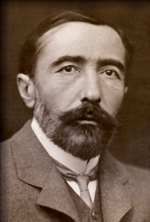
Edward Said's first book was Joseph Conrad and the Fiction of Autobiography (1966). It was based on his PhD work. Many people believe that the novel Heart of Darkness by Joseph Conrad was very important to Said's ideas.
Some of his other important books include:
- The World, the Text, and the Critic (1983)
- Culture and Imperialism (1993)
- Representations of the Intellectual (1994)
- Humanism and Democratic Criticism (2004)
About Orientalism
Said became a well-known thinker with his book Orientalism (1978). This book criticized how the Western world often saw the Middle East. He argued that Western culture created false and romantic ideas about Asia and the Middle East.
Said believed these ideas helped justify colonialism and imperialism by European powers and the U.S. He also criticized Arab leaders who accepted these false ideas about their own culture.
Orientalism suggested that much of the Western study of Islamic civilization was not truly objective. Instead, it was often meant to make European identity feel stronger. Said argued that this field of study sometimes led to cultural discrimination. He said that Western "Orientalists" often claimed to know more about "the Orient" than the people from the Orient themselves.
Said argued that the way Western art and texts showed the East was often wrong. He said that even seemingly fair Western writings about the East were biased because of Europe's history of controlling Asian civilizations. This meant that colonized people were often seen as unable to speak for themselves. So, Western scholars wrote the history of the East, making the West seem like the normal standard.
Discussions About Orientalism
Orientalism caused a lot of debate among academics. Some traditional scholars felt that Said's book unfairly criticized their work. For example, Said said that scholar Bernard Lewis's work was like "propaganda" against his subject. Lewis replied that Said was making academic study too political.
Said's book had a huge impact. It became a key text in post-colonial studies. This field tries to understand the world after colonialism. Many scholars agree that Said showed how negative images of the East were linked to imperial actions.
Orientalism changed how people studied the humanities. Some critics felt it limited scholars, while supporters said it opened up new ways of thinking. Its ideas were especially useful in Middle Eastern studies and literary criticism.
His Political Views
After the Six-Day War in 1967, Said became a public voice. He wanted to correct the wrong ideas about the Arab–Israeli wars in the U.S. news. He felt that the media often ignored the real history of the Middle East.
Said wrote about the importance of a Jewish homeland and the right of Palestinians to have their own country. His books about Israel and Palestine include The Question of Palestine (1979) and The Politics of Dispossession (1994).
Palestinian National Council
From 1977 to 1991, Said was a member of the Palestinian National Council (PNC). In 1988, he supported the idea of a two-state solution for the Israeli–Palestinian conflict. He voted for the creation of a State of Palestine.
However, in 1993, Said left the PNC. He disagreed with the Oslo Accords, which were peace agreements. He felt the terms were not good enough for Palestinians. He believed that Yasser Arafat had given up too much, especially the right of Palestinian refugees to return to their homes.
Because of his criticisms, the Palestinian Authority (PA) banned his books for a time. But they lifted the ban when Said praised Arafat for rejecting some offers at the Middle East Peace Summit in 2000.
In 1998, Said made a BBC documentary called In Search of Palestine. In it, he visited places from his childhood and showed the challenges faced by Palestinians. This film was not shown by any American TV company.
In Palestine
On July 3, 2000, while visiting the Middle East, Said was photographed throwing a stone across the border between Lebanon and Israel. This caused a lot of criticism, with some people saying it showed he supported terrorism. One journalist called him "The Professor of Terror."
Said explained that it was just a small pebble and no one was nearby. He said it was a playful act with his son and a sign of joy that Israel had left southern Lebanon. His university, Columbia, defended his action as an academic's freedom of expression. However, the incident still caused problems for him, including a canceled lecture invitation in Austria.
Views on U.S. Foreign Policy
Said also criticized how Western news media reported on the Middle East and Islam. He felt they often focused on stereotypes and conspiracy theories. He also saw U.S. military actions, like in the Kosovo War, as imperial. He believed that U.S. support for Israel contributed to instability in the Middle East.
Music
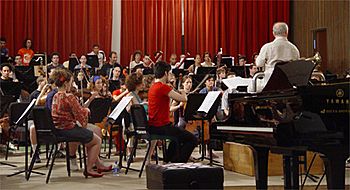
Besides being a public thinker, Edward Said was a talented pianist. He was also a music critic for The Nation magazine. He wrote several books about music, including Musical Elaborations (1991) and Parallels and Paradoxes: Explorations in Music and Society (2002), which he wrote with Daniel Barenboim.
In 1999, Said and Barenboim started the West-Eastern Divan Orchestra. This orchestra is made up of young Israeli, Palestinian, and Arab musicians. They also created The Barenboim–Said Foundation in Seville, Spain. This foundation helps with music education projects, including the orchestra and musical programs in Palestine.
Awards and Honors
Edward Said received many awards and honors during his life. He was given about twenty honorary university degrees. Some of his awards include:
- The Bowdoin Prize from Harvard University.
- The Lionel Trilling Book Award twice.
- The Wellek Prize and the Spinoza Lens Prize.
- The Lannan Literary Award for Lifetime Achievement in 2001.
- The Prince of Asturias Award for Concord in 2002 (shared with Daniel Barenboim).
- He was the first U.S. citizen to receive the Sultan Owais Prize for Cultural & Scientific Achievements.
- His autobiography, Out of Place (1999), won three awards, including the 1999 New Yorker Book Award for Non-Fiction.
Death and Legacy
Edward Said passed away on September 24, 2003, in New York City. He was 67 years old and had been sick with chronic lymphocytic leukemia for 12 years. He was survived by his wife, Mariam C. Said, and his children, Wadie and Najla Said. Many famous writers and thinkers wrote tributes to him after his death. Said is buried in Lebanon.
In November 2004, Birzeit University in Palestine renamed its music school the Edward Said National Conservatory of Music in his honor.
Many books and institutions have been created to remember Edward Said. These include Waiting for the Barbarians: A Tribute to Edward W. Said (2008) and Edward Said: The Charisma of Criticism (2010). The Barenboim–Said Academy was also established in Berlin in 2012.
In 2002, a special professorship, the Edward Said Chair, was created at Columbia University. It is currently held by Rashid Khalidi.
See also
 In Spanish: Edward Said para niños
In Spanish: Edward Said para niños
- Edward Said bibliography
- List of Columbia University people
- List of peace activists
- Projects working for peace among Arabs and Israelis
- Orientalism
 | Emma Amos |
 | Edward Mitchell Bannister |
 | Larry D. Alexander |
 | Ernie Barnes |



